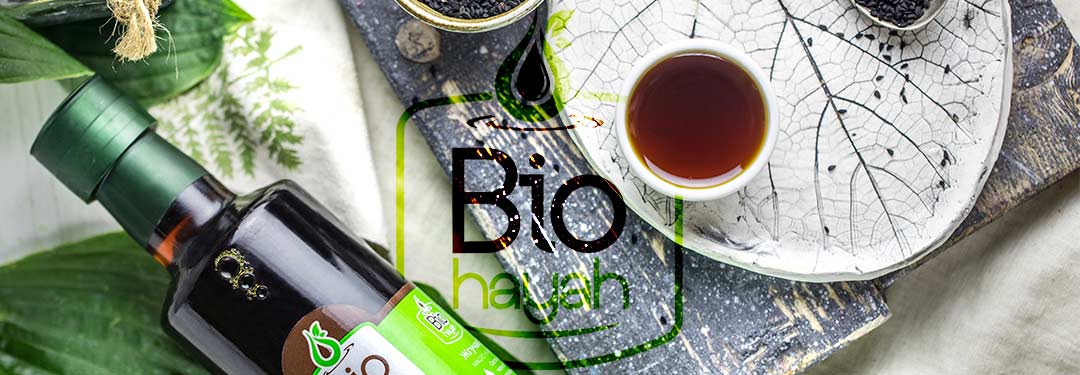So if – unfortunately – you are learning about black seed oil. Or black cumin seed oil, for the very first time. Well, you’re kind of late! Like a few millennia late. But we’ll get to that… In TIME! Get it? Anyways… It’s better late than never to unlock an historically acclaimed… Elixir of old… But presently extolled! Yes. Let us be brave! And let us be bold! As we embark upon an impressive mission to answer the question… Black seed oil, what is it good for?
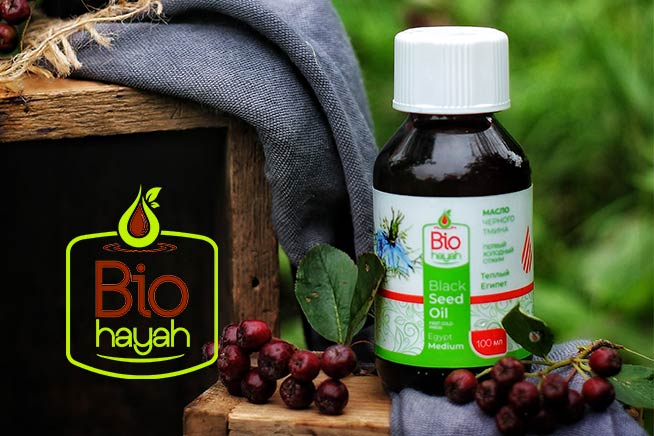
So what is black seed oil anyway?
As it’s talked about often. So let’s explain. With a meticulous explanation. So black seed oil is a natural oil derived from the seeds of the nigella sativa plant. Derived by way of extraction. For example, by way of the cold-press oil extraction method. It has been used for centuries. Topically (applied externally on skin & hair etc.). And orally (self-explanatory). So, this herbal oil is rated by academics as being… A top rating. A based upon evidence… It’s an Exemplary herbal medicine.
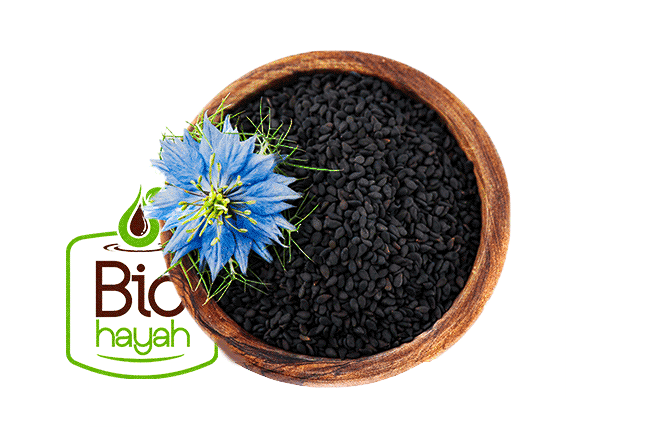
Know about the Nigella sativa?
So, the name Nigella comes from the older Latin term nigellus. Which means black. And also, when used for naming variations such as nigel in irish gaelic… It can mean champion. So, the black champion or nigella sativa is an all-annual plant belonging to the Ranunculaceae (Buttercup) family. Which produces tiny black seeds in it’s flower. Furthermore, the Nigella sativa is a small shrub. Also, the Nigella sativa’s flowers are fragile.
Additionally, they are usually coloured yellow. White. Pale purple. Pink. Or pale blue. With white. Purple. Or even blueish-tinged petals. Ahhh! That’s the stuff. Beautiful!
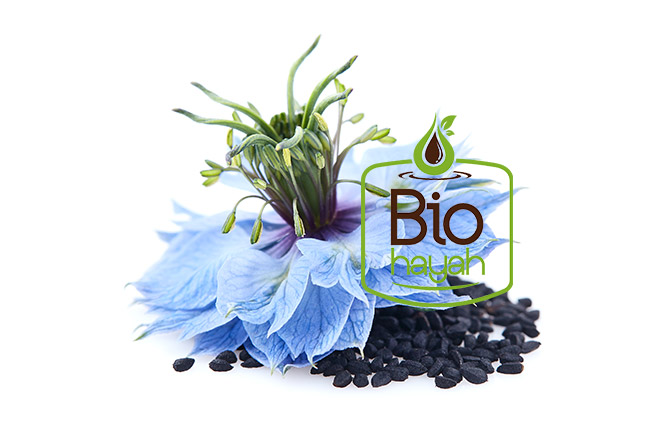
But, did you know the Nigella sativa also grows to between around half a foot to three feet (20-90cm approximately)? No, really?! Wowzer!
Also, the N. sativa has wispy foliage. Also, the Nigella sativa’s fruit is similar in nature to a capsule. And it’s these very capsules that are filled with black seeds! Well, it’s black seeds to may be us & a lot of western regions per se. But as for the rest of the world… Well, let’s see what they have to say…

Naming the blessed seed…
Just get into this! Just have a go! Guess how many names there are for Nigella sativa’s black seeds? Well, we don’t actually have an exact number. But we do have some names… Along with their associated regions. Languages. Or cultures:
Kalonji – Hindi
Kala Zeera – Urdu
Black cumin – English
Kalo zeera – Bangladesh
сиёх дона – Turjikstan
sahajīrakaṁ – Malaysian
zireh kuhi – Persia
Graine de nigella- French
Hak Jung Chou – Chinese
Nigella Schwarzkümmel – German

The Taste of Black Seed Oil…
So, know we’ve looked into how different languages. Or regions refer to black seed oil. Let’s take something from its taste… So, depending upon the region the black seeds originate from they’ll have a rather potent aromatic smell. And likewise taste. That intensifies after their extraction to oil form. Rather, the taste can become quite spicy-peppery to scintillating, blazing-hot, eye-watery! Again, depending upon the black seeds’ country of origin. And – note to retailers – it’s this potency that end-consumer often associates with the medicinal effect of the black seed oil they’ve purchased from you. So, to them… The more potent it is… The more medicinal power it has!

Cold-Pressing Black Seed Oil What is it Good For?
Cold pressed black seeds? What is the meaning of such a thing. You may ask? Well, cold pressing is a process where oils are obtained naturally by crushing oil seeds via a screw-crushing mechanism for example. So, in this process no extra heat should added. Nor chemicals! Thus, making cold pressed oils arguably the healthiest form of natural oils available to us.
As for pure cold pressed black seed oil… Then it is good for internal (oral) consumption. As a health supplement. As well as external (topical) application. Such a pure form of black seed oil can also be considered as a full spectrum black seed oil! So internal and external usage. It’s a win win!
Now that we have established the foundation of what black seed oil is… Where it comes from… What it is called… What it should taste and smell like… You may be wondering… Who exactly can vouch for it? When was the black seed first planted into the minds and lands of human civilization?
So, before we dive into its’ modern benefits… And answer, ‘black seed oil, what is it good for?’… From a more recent view on human health. Let’s delve into its ancient history!

Black Seed Oil, What was it Historically Good for? Benefits Spanning Millennia…
So here are some early accounts of black seed oil… It’s benefits! And who backed it!

Cleopatra and her Organic Black Seed Oil
You guessed it. Organic black seed oil! Authenticity at its finest. Long before all those perilous pesticides and gloomy GMO’S.
Small disclaimer: Well it is difficult to know exactly whether or not the version that Cleopatra used was indeed organic. But as we’ve previously mentioned… Her time… Approximately 2,049 years ago… The earth most likey wasn’t tainted with harmful chemicals. Like cesium. Agent orange etc… So based on this, Cleopatra’s black seed oil was most likely highly organic.
So, you may have heard of the so-called queen Cleopatra VII Philopator due to her being the purported last Egyptian pharaoh. Moreover, she is said to have had many accomplishments. And from them:
- Building up the Egyptian economy.
- Establishing trade with the Arabs.
- Being one of the most popular Egyptian rulers of all time.
- Being the only Ptolemaic ruler to learn the Egyptian language.
But were you aware of the fact that she was said to be a femme fatale. Really?? Yes! Known for her enticing charisma. Stimulating presence. ‘A woman of surpassing beauty’ is what some have said to describe her.
So was she not distinguished for her attraction? Was it beauty sleep? Perhaps a special type of skin routine not known to us of the later human era? Lo and Behold! It was reported that she used black seed oil in her baths!
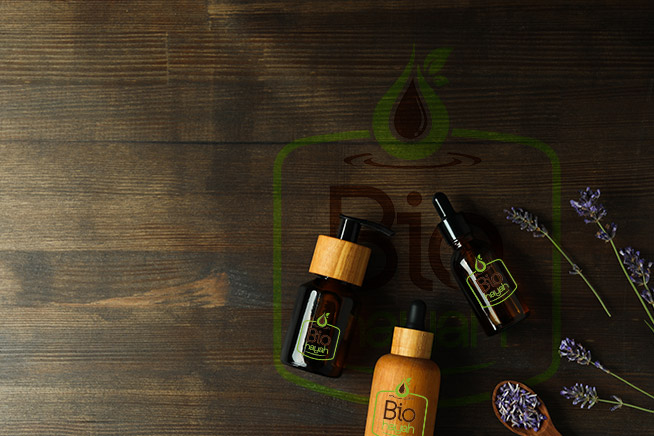
Queen Nefertiti: The ravishing woman has come
Yes! Enter Queen Nefertiti. Royal wife of Pharaoh Akhenaten. So, the Queen of Ancient Egypt’s 18th Dynasty. Illustriously known as one of the most famous women in history! Even in today’s ever-changing world, her legacy influences current cosmetics. But once again black seed oils’ legacy shines through! Within the history of this so-called monarch. But how?
Well, black seed oil was an important ingredient for Nefertiti. Especially engrained into the fine follicles of her hair care routine. For indeed academic works describe how Queen Nefertiti would use it to luster her nails. Whilst also, using black seed oil to give her hair a new – found colourful radiance. Bolstering her hair health!
Furthermore, did you know that Nefertiti was said to be step-mother to arguably the world’s most famous Pharaoh? But who? Just guess… Or need a clue? So here’s a clue…
He was… Companion of the famous treasures allegedly found with him inside his tomb!
Did you guess correctly?

Young Tutankhamun and Nigella sativa
Yes! Taking the throne at just 9 years old. Young Tutankhamun is arguably one of the youngest monarchs on record. But what intruges us here… Is what was found with his dead body more so than any life-time accomplishments.
So, archaeologist Howard Carter (from Kensington, London, England, United Kingdom) found black seeds or black seed oil in Tutankhamun’s forgotten tomb. And this along with seriously expensive items. Such as a 24 pound solid gold mask worth about $2million today. Now that’s a serious bit of coin! Found along with that were other luxuries of their day… But do you know why these riches were found in a tomb? Yes! A tomb! Essentially a grave! A burial site. So why were they there?
Firstly, ancient Egyptians were misguided polytheists. And according to their creed… Deceased royalty were to be given material provisions for the afterlife. And just like in the worldly life… The provisions given to a king, could only be fit for a king! So, the very best of what their society had to offer was duly placed along-side the given royal. As a supply for his/her next life. According to their beliefs! So, therefore it doesn’t surprise us that the blessed black seed was present amongst the best! So, ponder this momentarily… And ask yourself, “if black seed is good enough for a king… Isn’t it good enough for me?”
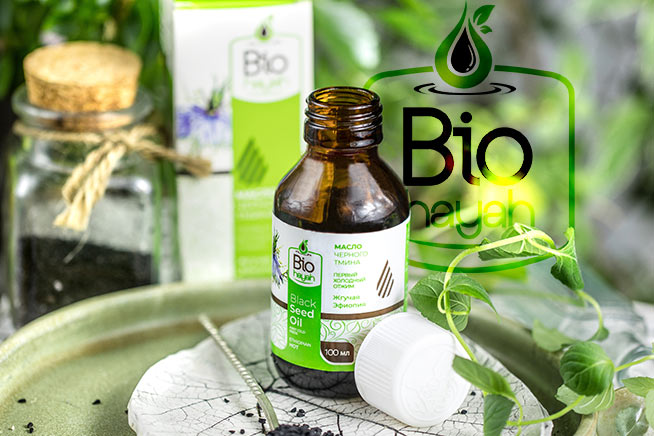
Black Seed Oil: Fit for a King
So, the whole point here is that these monarchs. Like any monarch at any time. Past or present. Would have had access to the very best of their time! From education. To residences. Transportation. And services. And of course… Healthcare and nutrition! So, we can conclude that in this fascinating civilization… A civilization that is still surrounded by mystery and unsolved wonders… So, in this civilization… Black cumin seed oil was from the best of healthcare and nutrition! So, it’s safe to say that they… The ancient Egyptians most likely already knew the answer to our question… “Black seed oil, what is it good for!”
So let’s now let’s try to unearth what they knew… As we look into academic evidence to answer our question… That’s right…

Black Seed Oil, what is it Good For?
That’s right! The black cumin seed isn’t just any herb! And likewise… Black Seed Oil isn’t any natural oil!
Ibn Sina’s Discoveries on the Uses of Black Seed Oil
So, Ibn Sina. also known as Avicenna. Or ابن سينا in Arabic. was a Persian polymath who made significant contributions to various fields. Including medicine. And science. He is widely regarded as one of the most influential figures in the Islamic Golden Age and his work continues to impact modern knowledge in many areas.
Ibn Sina extensively studied the uses of black seed oil which had been used for millennia in traditional medicine systems. Including Unani medicine. So, through his studies… Ibn Sina documented multiple applications for black seed oil. Notably in his renowned medical encyclopedia, “The Canon of Medicine”. But in summary, he emphasized its effectiveness in promoting overall well-being and maintaining health.

Respiratory Issues
So, firstly… Ibn Sina highlighted the use of black seed oil in alleviating respiratory conditions such as asthma. Bronchitis. And coughs. He noted its ability to act as a bronchodilator (causing the widening of the bronchi). As well as an expectorant (helping to clear mucus (phlegm) from your airway). Thus relieving respiratory congestion. And promoting easier breathing.
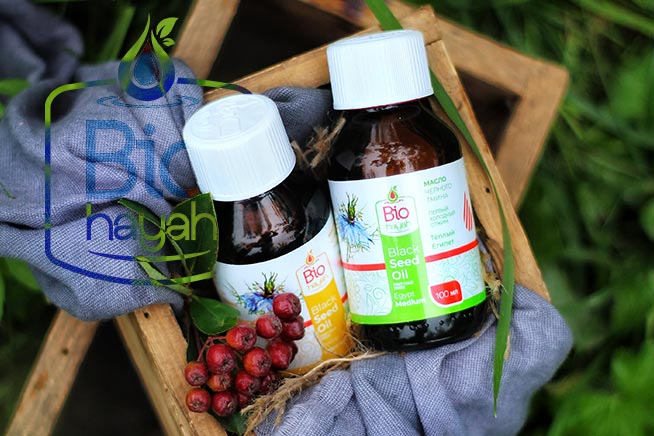
Digestive Issues
Secondly, in his writings… Ibn Sina also documented the use of black seed oil for addressing digestive problems. He noted its potential to aid digestion. Reduce bloating. And alleviate symptoms of indigestion. Additionally, he recognized its role in promoting liver health. And supporting overall digestive function.
Inflammatory Conditions
Thirdly, Ibn Sina acknowledged the anti-inflammatory properties of black seed oil. And its potential to mitigate various inflammatory conditions. Also, he recommended its use for managing arthritis. Joint pain. And other inflammatory disorders.
Amazingly, his observations align with modern research that has demonstrated the anti-inflammatory effects of black seed oil.
Skin Problems
Additionally, Ibn Sina explored the application of black cumin seed oil in skincare. He described its use for treating skin conditions such as eczema. Psoriasis. As well as acne. Also, he emphasized its moisturizing and soothing effects on the skin, attributing these benefits to its rich composition of essential fatty acids and antioxidants.

Ibn Sina Findings Transcending the Modern Era
So, contemporary scientific studies have corroborated many of Ibn Sina’s findings regarding what black seed oil is good for.
Research has revealed its potential anti-inflammatory. Antioxidant. Antimicrobial. And immunomodulatory properties. Moreover, clinical trials have demonstrated its efficacy in managing respiratory disorders. Gastrointestinal issues. Inflammatory diseases. And skin conditions.
Therefore, Ibn Sina’s extensive exploration of the uses of black seed oil in traditional medicine has left a lasting legacy! His insights into the therapeutic applications of this natural remedy continue to be validated by modern scientific investigations. Thus, the enduring relevance of his work underscores the profound understanding he possessed regarding the medicinal value of black seed oil. Whilst, giving an accurate answer to our question of… “Black Seed Oil, what is it Good For?”

Applications to Your Life
Yes! We now know that black seed oil is a holistic remedy… An extraordinary alternative to those pills with exhaustive side effects. Enriched with nutrients from far and wide, come rain or shine it will leave you feeling sublime!
With that being said, the following inquests must be put forth. How will blackseed oil change your life… After feeling lethargic, knowing you can reach new heights. But never having that final push to propel you into a distinctive healthcare maintenance dream. Do you not deserve to look and feel pristine?
Even if you have a healthcare routine in place, don’t deprive yourself of this astonishing nutraceutical. Instead let us take a look at the exceptional, purely natural, comprehensive solution in detail below… So, let’s look at even more black seed oil benefits you didn’t know. About! Get it!

The Compound Within
So, as aforementioned, black seed oil is known to have an abundance of benefits! Facts! But you may not be aware of the compounds within it that have been shown to be the active ingredients behind the medicinal effects. Such as the anti-inflammatory effect. Which helps reduce inflammation in the body. So what are these active compounds…?
Thymoquinone
Also known as TQ… Thymoquinone is known as an emerging natural drug with a wide range of medical applications…”… So, thymoquinone, a bioactive compound, has gained significant attention in recent years. Additionally, this compound has been found to offer a wide range of health benefits. From them:
Anti-Cancer Properties
Firstly, thymoquinone has been found to possess potent anti-cancer properties. Which have been extensively studied in various research papers. According to a study published in the Journal of Cancer Research, thymoquinone inhibited the growth of breast cancer cells and induced apoptosis (cell death) in those cells. Thus, suggesting its potential as an anti-cancer agent.
Another study published in the journal Nutrition and Cancer found that thymoquinone suppressed the growth of colon cancer cells. And reduced the expression of inflammatory markers. Thus, indicating its ability to prevent cancer progression.
Anti-Inflammatory Effects
Secondly, thymoquinone has also been found to possess potent anti-inflammatory properties. Which can help alleviate various inflammatory conditions such as:
- Arthritis.
Asthma.
And allergies.
Furthermore, a study published in the Journal of Inflammation found that thymoquinone inhibited the production of pro-inflammatory cytokines. And enzymes. Which are responsible for causing inflammation.
Additionally, another study published in the journal Phytotherapy Research found that thymoquinone reduced inflammation in a mouse model of colitis. Suggesting its potential as a therapeutic agent for inflammatory bowel diseases.

Cardiovascular Health
Thirdly, thymoquinone has been found to have potential cardiovascular benefits. Including reducing cholesterol levels. Improving blood flow. And preventing platelet aggregation. A study published in the Journal of Nutrition found that thymoquinone lowered cholesterol levels. And improved lipid profiles in rats fed a high-cholesterol diet.
Furthermore, another study published in the journal Platelets found that thymoquinone inhibited platelet aggregation. Which can help prevent cardiovascular diseases such as heart attacks and strokes.
Neuroprotective Effects
Fourthly, thymoquinone has also been found to have potential neuroprotective effects. Which can help alleviate various neurodegenerative diseases such as Alzheimer’s disease. Parkinson’s disease. And multiple sclerosis.
Actually, a study published in the Journal of Neuroinflammation found that thymoquinone reduced inflammation. And oxidative stress in a mouse model of Alzheimer’s disease.
Also, another study published in the journal Neuropharmacology found that thymoquinone protected against cognitive impairment. And neuronal damage in a mouse model of Parkinson’s disease.
Other Benefits
Thymoquinone has been found to have other potential health benefits, including:
- Anti-bacterial and anti-fungal properties: Thymoquinone has been found to have antimicrobial properties, which can help prevent the growth of harmful bacteria and fungi.
- Immune system support: Thymoquinone has been found to stimulate the immune system, which can help protect against infections and diseases.
- Skin health: Thymoquinone has been found to have antioxidant and anti-inflammatory properties, which can help protect the skin against damage and promote healthy aging.

Conclusion
So, to conclude… We know that answering the question, ‘black seed oil, what is it good for?’… Isn’t the best question… Rather, black seed oil, what isn’t it good for, is more befitting. And that’s based upon the absolute plethora of health benefits black seed oil seems to offer. So, we should ask ourselves, ‘what is stopping us from taking black seed oil as a daily immune-boosting supplement?’ May be you don’t know where to find good quality black seed oil, with high thymoquinone (TQ)?
Well, that’s our job. Yes! As suppliers of high quality, cold-pressed natural oils you can count on Biohayah to respond to you black seed oil needs. And that’s retail. Wholesale. Private label. As well as distribution!
So contact us today for amazing black seed oil. Wherever you are!
Thanks for reading!
